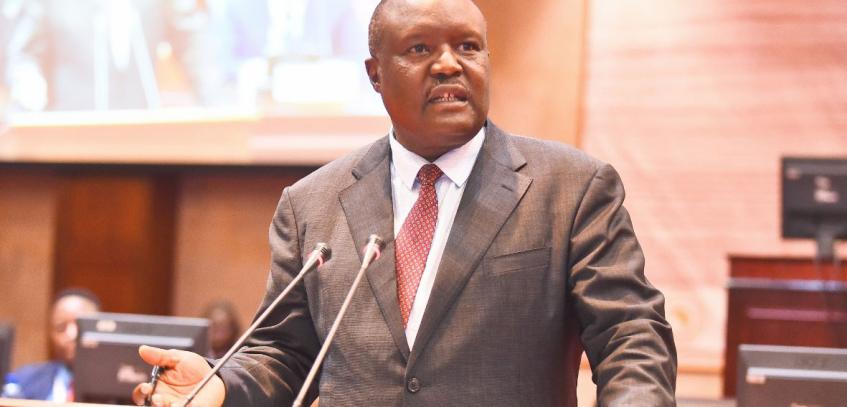The Pan-African Parliament (PAP) Performance Review Report (PRR), presented by H.E Hon Chief. Fortune Charumbira was unanimously adopted by members of the continental Parliament at the ongoing first Ordinary Session of the sixth Parliament.
This marked the transition from the traditional “Activity Report” to an assessment which looks at tangible achievements, assesses performance, identifies strengths and weaknesses, and sets goals for future performance. The move has been hailed by African Parliamentarians who have expressed confidence in the current’s leadership ability to effectively deliver on its commitment to “revive, renew, reposition, and reinvigorate” Africa’s supreme parliamentary body.
The Performance Review Report sought to present the activities undertaken by the PAP since the elective session in June 2022, the results achieved as well as challenges faced by the institution in the execution of its results.
“There is a deliberate change in the thrust of your new Bureau, from merely activity-based reporting to results-based reporting,” said H.E Hon. Charumbira while delivering the PPR to the plenary session held under the African Union theme for 2022, “Building resilience in nutrition on the African continent: Accelerate the human capital, social and economic development”.
“This explains why we have changed even the title of this report from an Activity Report to a Performance Review Report. In this new dispensation, we are deliberately moving away from counting the number of bees that visit the flowers to focusing on the number of bees that actually produce the nectar. We are moving away from the common mistake of conflating activities with results.”
H.E Hon Charumbira underscored that African legislators must demonstrate the results of the work that the PAP is doing for them to win the support of the African citizenry. He further appreciated the achievements done by the incumbent Bureau promising to continue their hard work.
“PAP will not relent and will continue to undertake its responsibilities towards enhancing peace and security, the promotion of democracy and the socio-economic development of the peoples of Africa. The newly elected Bureau is committed to the rejuvenation and revitalisation of the PAP as evidenced by the achievements that have been recorded within this short period of time,” he added.
The results of the Performance Review Report are anchored on the four thematic objectives of the PAP 2019-2023 Strategic Plan. This includes strengthening the parliamentary functions of the PAP; strengthening the partnership, coordination, outreach and institutional capacity of the PAP; promoting the PAP’s support of human rights and social inclusion goals of the AU and strengthening learning and sharing, knowledge management, communication, and advocacy of the PAP.
The report highlighted the entrenchment of the principle of rotation in the election of the Bureau and Bureaux of the sixth Parliament of the PAP, the first meeting of the Permanent Standing Committees, the Strategic Reorientation workshop for members of parliament, the development of Model laws as well as the participation in the 41st Ordinary Session of the Executive Council and the 4th mid-year coordination meeting of the African Union (AU) and the Regional Economic Communities, as some of the key deliverables since June 2022.
It further noted the engagements with other arms of the Union such as the Department of Political Affairs, Peace and Security (PAPS), the AU institutional reform team, the AUDA-NEPAD and the APRM. The President of the PAP also mentioned the hosting of the Eleventh Conference of the Speakers of Regional and National Parliaments in Africa and the 4th Meeting of Secretaries-General of African Parliaments (ASGAP) as two critical consultations that yielded expected results.
Following the presentation, African legislators had robust engagements and deliberations before adopting the commendable report. The debate centred around numerous issues including the ratification of the Malabo Protocol, budgetary constraints faced by the Parliament and the urgent need to improve the livelihoods of African citizenry.
-Ends-








